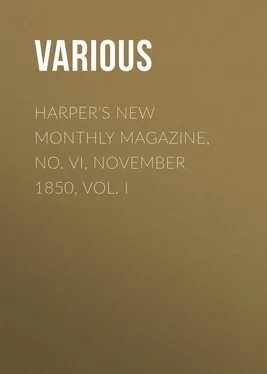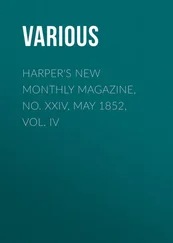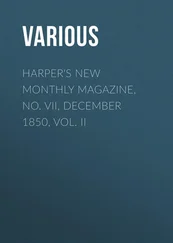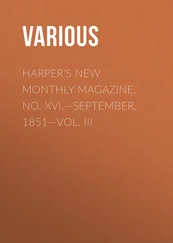Various - Harper's New Monthly Magazine, No. VI, November 1850, Vol. I
Здесь есть возможность читать онлайн «Various - Harper's New Monthly Magazine, No. VI, November 1850, Vol. I» — ознакомительный отрывок электронной книги совершенно бесплатно, а после прочтения отрывка купить полную версию. В некоторых случаях можно слушать аудио, скачать через торрент в формате fb2 и присутствует краткое содержание. Издательство: Иностранный паблик, Жанр: periodic, foreign_edu, на английском языке. Описание произведения, (предисловие) а так же отзывы посетителей доступны на портале библиотеки ЛибКат.
- Название:Harper's New Monthly Magazine, No. VI, November 1850, Vol. I
- Автор:
- Издательство:Иностранный паблик
- Жанр:
- Год:неизвестен
- ISBN:нет данных
- Рейтинг книги:5 / 5. Голосов: 1
-
Избранное:Добавить в избранное
- Отзывы:
-
Ваша оценка:
- 100
- 1
- 2
- 3
- 4
- 5
Harper's New Monthly Magazine, No. VI, November 1850, Vol. I: краткое содержание, описание и аннотация
Предлагаем к чтению аннотацию, описание, краткое содержание или предисловие (зависит от того, что написал сам автор книги «Harper's New Monthly Magazine, No. VI, November 1850, Vol. I»). Если вы не нашли необходимую информацию о книге — напишите в комментариях, мы постараемся отыскать её.
Harper's New Monthly Magazine, No. VI, November 1850, Vol. I — читать онлайн ознакомительный отрывок
Ниже представлен текст книги, разбитый по страницам. Система сохранения места последней прочитанной страницы, позволяет с удобством читать онлайн бесплатно книгу «Harper's New Monthly Magazine, No. VI, November 1850, Vol. I», без необходимости каждый раз заново искать на чём Вы остановились. Поставьте закладку, и сможете в любой момент перейти на страницу, на которой закончили чтение.
Интервал:
Закладка:
Various
Harper's New Monthly Magazine, No. VI, November 1850, Vol. I
A PILGRIMAGE TO THE CRADLE OF AMERICAN LIBERTY.
WITH PEN AND PENCIL
1 1 This sketch of Revolutionary scenes and incidents in and about Boston, is part of an unpublished chapter from Lossing's "Pictorial Field Book of the Revolution," now in course of publication by Harper and Brothers.
"How suddenly that straight and glittering shaft
Shot thwart the earth! in crown of living fire
Up comes the day! As if they conscious quaff'd
The sunny flood, hill, forest, city spire
Laugh in the waking light."
t was a glorious October morning, mild and brilliant, when I left Boston to visit Concord and Lexington. A gentle land-breeze during the night had borne the clouds back to their ocean birth-place, and not a trace of the storm was left except in the saturated earth. Health returned with the clear sky, and I felt a rejuvenescence in every vein and muscle when, at dawn, I strolled over the natural glory of Boston, its broad and beautifully-arbored Common. I breakfasted at six, and at half-past seven left the station of the Fitchburg rail-way for Concord, seventeen miles northwest of Boston. The country through which the road passed is rough and broken, but thickly settled. I arrived at the Concord station, about half a mile from the centre of the village, before nine o'clock, and procuring a conveyance, and an intelligent young man for a guide, proceeded at once to visit the localities of interest in the vicinity. We rode to the residence of Major James Barrett, a surviving grandson of Colonel Barrett, about two miles north of the village, and near the residence of his venerated ancestor. Major Barrett was eighty-seven years of age when I visited him; and his wife, with whom he had lived nearly sixty years, was eighty. Like most of the few survivors of the Revolution, they were remarkable for their mental and bodily vigor. Both, I believe, still live. The old lady – a small, well-formed woman – was as sprightly as a girl of twenty, and moved about the house with the nimbleness of foot of a matron in the prime of life. I was charmed with her vivacity, and the sunny radiance which it seemed to shed throughout her household; and the half hour that I passed with that venerable couple is a green spot in the memory.
Major Barrett was a lad of fourteen when the British incursion into Concord took place. He was too young to bear a musket, but, with every lad and woman in the vicinity, he labored in concealing the stores and in making cartridges for those who went out to fight. With oxen and a cart, himself, and others about his age, removed the stores deposited at the house of his grandfather, into the woods, and concealed them, a cart-load in a place, under pine boughs. In such haste were they obliged to act on the approach of the British from Lexington, that, when the cart was loaded, lads would march on each side of the oxen and goad them into a trot. Thus all the stores were effectually concealed, except some carriage-wheels. Perceiving the enemy near, these were cut up and burned; so that Parsons found nothing of value to destroy or carry away.
From Major Barrett's we rode to the monument erected at the site of the old North Bridge, where the skirmish took place. The road crosses the Concord River a little above the site of the North Bridge. The monument stands a few rods westward of the road leading to the village, and not far from the house of the Reverend Dr. Ripley, who gave the ground for the purpose. The monument is constructed of granite from Carlisle, and has an inscription upon a marble tablet inserted in the eastern face of the pedestal. 2 2 The following is a copy of the inscription: Here, On the 19th of April, 1775, was made the first forcible resistance to British Aggression On the opposite bank stood the American militia, and on this spot the first of the enemy fell in the War of the Revolution, which gave Independence to these United States In gratitude to God, and in the love of Freedom, This Monument was erected, A.D. 1836
The view is from the green shaded lane which leads from the highway to the monument, looking westward. The two trees standing, one upon each side, without the iron railing, were saplings at the time of the battle; between them was the entrance to the bridge. The monument is reared upon a mound of earth a few yards from the left bank of the river. A little to the left, two rough, uninscribed stones from the field mark the graves of the two British soldiers who were killed and buried upon the spot.
We returned to the village at about noon, and started immediately for Lexington, six miles eastward.
Concord is a pleasant little village, including within its borders about one hundred dwellings. It lies upon the Concord River, one of the chief tributaries of the Merrimac, near the junction of the Assabeth and Sudbury Rivers. Its Indian name was Musketaquid. On account of the peaceable manner in which it was obtained, by purchase, of the aborigines, in 1635, it was named Concord. At the north end of the broad street, or common, is the house of Col. Daniel Shattuck, a part of which, built in 1774, was used as one of the depositories of stores when the British invasion took place. It has been so much altered, that a view of it would have but little interest as representing a relic of the past.
The road between Concord and Lexington passes through a hilly but fertile country. It is easy for the traveler to conceive how terribly a retreating army might be galled by the fire of a concealed enemy. Hills and hillocks, some wooded, some bare, rise up every where, and formed natural breast-works of protection to the skirmishers that hung upon the flank and rear of Colonel Smith's troops. The road enters Lexington at the green whereon the old meeting-house stood when the battle occurred. The town is upon a fine rolling plain, and is becoming almost a suburban residence for citizens of Boston. Workmen were inclosing the Green, and laying out the grounds in handsome plats around the monument, which stands a few yards from the street. It is upon a spacious mound; its material is granite, and it has a marble tablet on the south front of the pedestal, with a long inscription. 3 3 The following is a copy of the inscription: "Sacred to the Liberty and the Rights of Mankind!!! The Freedom and Independence of America – sealed and defended with the blood of her sons – This Monument is erected by the Inhabitants of Lexington, under the patronage and at the expense of the Commonwealth of Massachusetts, to the memory of their Fellow-citizens, Ensign Robert Monroe, Messrs. Jonas Parker, Samuel Hadley, Jonathan Harrington, jun., Isaac Muzzy, Caleb Harrington, and John Brown, of Lexington, and Asahel Porter, of Woburn, who fell on this Field, the first victims of the Sword of British Tyranny and Oppression, on the morning of the ever-memorable Nineteenth of April, An. Dom. 1775. The Die was Cast!!! The blood of these Martyrs in the Cause of God and their Country was the Cement of the Union of these States, then Colonies, and gave the Spring to the Spirit, Firmness, and Resolution of their Fellow-citizens. They rose as one man to revenge their Brethren's blood, and at the point of the Sword to assert and defend their native Rights. They nobly dared to be Free!!! The contest was long, bloody, and affecting. Righteous Heaven approved the Solemn Appeal; Victory crowned their Arms, and the Peace, Liberty, and Independence of the United States of America was their glorious Reward. Built in the year 1799."
The design of the monument is not at all graceful, and, being surrounded by tall trees, it has a very "dumpy" appearance. The people are dissatisfied with it, and doubtless, ere long, a more noble structure will mark the spot where the curtain of the revolutionary drama was first lifted.
Интервал:
Закладка:
Похожие книги на «Harper's New Monthly Magazine, No. VI, November 1850, Vol. I»
Представляем Вашему вниманию похожие книги на «Harper's New Monthly Magazine, No. VI, November 1850, Vol. I» списком для выбора. Мы отобрали схожую по названию и смыслу литературу в надежде предоставить читателям больше вариантов отыскать новые, интересные, ещё непрочитанные произведения.
Обсуждение, отзывы о книге «Harper's New Monthly Magazine, No. VI, November 1850, Vol. I» и просто собственные мнения читателей. Оставьте ваши комментарии, напишите, что Вы думаете о произведении, его смысле или главных героях. Укажите что конкретно понравилось, а что нет, и почему Вы так считаете.












